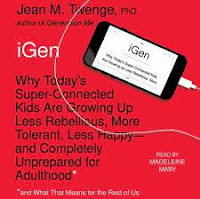There is more than a grain of skepticism in my view to generational analyses. Boomers do this while Gen X that. Gen X focuses on __X__ versus Millennials who want __Y__. And so on. My skepticism results from an understanding that we are all fundamentally human. Despite the advances in technology, living standards, medicine, etc., the blueprint for homo sapiens has not changed. We are all psychological, epistemological, physical, and emotional beings, not to mention every generation complains about the prior generation being too lazy, liberal, etc. And yet there are also grains of truth to generational analyses. There is no question that the youth of the West today are less hardened to the world. There are too many separate but common occurrences across culture that are markedly different to those just a few decades ago. Looking to highlight the latest generation of youth and the role screens/internet play in their lives and society is Jean Twenge’s iGen: Why Today's Super-Connected Kids Are Growing Up Less Rebellious, More Tolerant, Less Happy—and Completely Unprepared for Adulthood—and What That Means for the Rest of Us (2017).
iGen focuses on people born between 1995 and 2012 in the West, i.e. the first generation for whom life without smartphones is unknown. It offers comparisons to some of the prior, commonly referred to generations—the aforementioned boomers, gen-x, etc., while breaking down religious views, willingness to confront opposing views, emotional security, resilience, perceived age (vs actual), expectations, social time, sexual trends, and a variety of other areas.
And it’s precisely the ubiquity of the smartphone that Twenge identifies as the single, key element of iGeners’ identity. From social time to personal growth and perception, Twenge presents a situation wherein the small screen plays the heaviest role influencing life’s situations. The degree to which Twenge offers a convincing argument will depend on the knowledge the reader brings to the table regarding prior generations, social movements, sociology, and public opinion.
If there is anything to be skeptical about, it’s the shadow of personal opinion hanging over iGen. Twenge’s mode of presentation is generally journalistic/objective; the text reads smoothly and concisely in an easy to visualize structure, and more often than not specific studies are cited to support the ideas. Overall, the picture painted by Twenge’s analysis of the situation fits the real world I observe to a large degree. (The “iGen” are indeed weaker and less mentally prepared for the realities of adult life—so says my Gen X perspective.). But I’m not certain the picture is as dire as Twenge would have it be. While never describing a catastrophe, the reader is left on the edge of feeling one is inevitable. Another way of putting this is, where academics have issued strong warnings and concerns about the current generation throughout the decades, things always advance, civilization has not collapsed. The pastel may change hue, but it’s still a color.
One note for would be readers: iGen is heavily, heavily biased toward the USA. This is not a criticism, or to say that Twenge has failed at something, no. But it is to say that the lens with which Twenge writes is American culture. To some degree this is also global culture, but there are numerous specifics that cannot be extrapolated to other countries. Fundamental Protestantism, race, and other issues have a different flavor in each country, therefore be aware of the American bent.
In the end, iGen is likely a solid resource for anyone looking to understand the generation of youth coming into adulthood today, smartphone in hand. It brings together and presents a plausible explanation for much of the phenomenon we see around us in society, in the news, and sadly in comments sections. But is it the be-all end all? I would personally argue the situation is more complex and involves additional factors, but certainly Twenge gets the discussion off the ground and running.


No comments:
Post a Comment